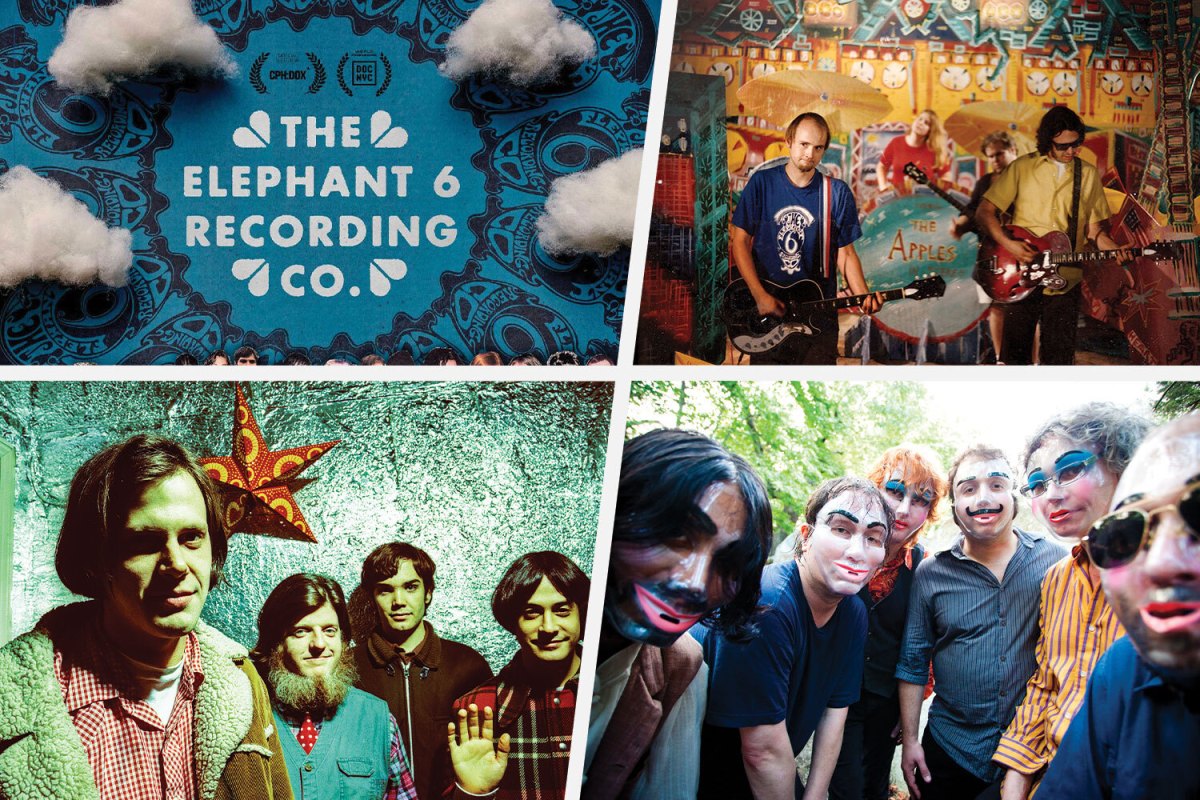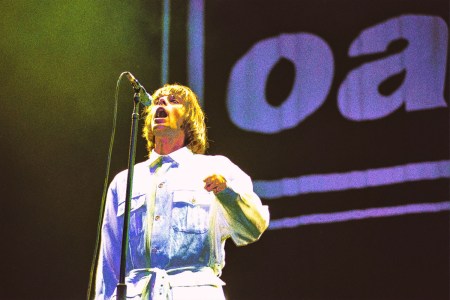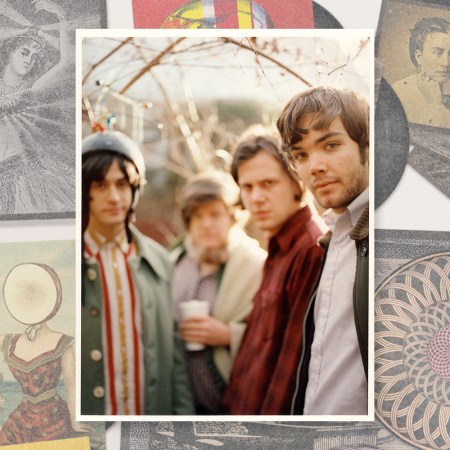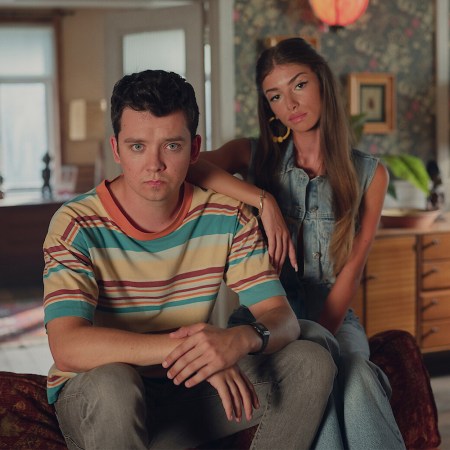Depending on your tastes and inclinations, Jeff Mangum might be an almost sacred figure of fasciation, a symbol for how the crushing weight of genius is more than most of us can bear, or a man who understood something about the very nature of life itself, but whose attempts to convey said truths nearly broke him.
Or maybe he’s a guy that your indie nerd acquaintances never, ever shut up about.
That’s all very arguable, especially if you or someone you know are one of the many people who have fallen under the spell of his band Neutral Milk Hotel’s 1998 album In the Aeroplane Over the Sea, a staple of dorm rooms, “best album ever” lists and message board discussions for 25 years now. Whether he was a sage or the type of artist who tends to get a lot of extra musical baggage placed on him is entirely a matter of opinion.
But one thing that can’t be argued is that at one point he was a guy sitting in one of his friend’s backyards, half-apologizing while introducing a rough but already enchanting new song.
“Hello everybody,” he says in the grainy clip. “It’s kind of twisted. Sorry about the really sick parts. I’ve got to work it all out.” Considering the myth around Mangum, and the scant amount of insight we have into who the man really was, it would be hard to argue it’s not a very striking sight.
He’s a legendary figure to many, but as demonstrated in director C.B. Stockfleth’s new documentary The Elephant 6 Recording Co., he was also a guy who spent the ‘90s making music with and for his friends in Athens, Georgia. And he had a lot of company in this regard.
The Elephant 6 Recording Co. serves as a loving document of a bygone scene, as well as a bit of a historical corrective. Elephant 6 was a nebulously defined group of bands that was started by a group of friends in Ruston, Louisiana that were enamored with making homemade songs on four-track recorders. The movement later spread across the country and then more or less settled in Athens, Georgia.
The founders of this collective included, yes, Neutral Milk Hotel, as well as the exuberantly hooky Apples in Stereo, led by the irrepressible Robert Schneider, and also The Olivia Tremor Control, a group of the astral travelers led by Will Hart and the late Bill Doss, roughly the art and rock guys, respectively, of the songwriting team. But eventually, the collective inducted like-minded souls such as The Music Tapes, Elf Power, Dressy Bessy, of Montreal and many more late ‘90s college radio favorites. (One suspects that the members of the collective were so nice that as long as you had a theremin and well-worn copy of The Piper at the Gates of Dawn, you were in.)
Their music suggested, for a few minutes of daydream pop bliss at a time, an alternate world where the ‘60s counterculture movement won out, and mankind lived in a utopia free of the forces that often prevent utopias. As such, there was no need for music to move beyond the Beatles, Zombies and Beach Boys, and we were all free to spend all day making and enjoying art.
But of course, it’s never quite as simple as the myths make it out to be, and Stockfleth’s film shows us the humans behind the legendary scene. He began the film in 2010, when Schneider moved to Lexington, Kentucky and fell in with his friend group of artists.
“He’d seen some of the work I was doing and he sort of approached me about the possibility of making this document about Elephant 6, which is not something that I knew very much about at all,” he says.
“But he had a lot of enthusiasm about it and he seemed to have this belief that for some reason I was the person that was going to be able to put this film together,” he adds. “I think maybe also it seemed like somebody from outside of the group or outside of the fanship of it even might make for an interesting angle.”
“Oasis Knebworth 1996” Captures a Transcendent Moment in Music History
The documentary captures the Britpop band at the height of its popularityIt was a very low-budget, run and gun way of working. He remembers “saving up a couple hundred dollars to try to drive down to Georgia and sleep on somebody’s floor and convince them to let me put a camera in their face and interview them. There’s so many people involved in this film that it took a long time to not only just meet everyone but to kind of gain their trust.”
Stockfleth describes his filmmaking technique as “non-journalistic.” “My interview technique is very naive,” he says. “When you do hear my voice, it’s like ‘What is Elephant 6 and why did you guys move here?’ These very childlike questions.”
Turns out, Stockfleth’s approach was ideal for a scene that felt childlike in the best way, wholesome and free of ego or any of the scary drugs. At the heart of it all, Elephant 6 was a group of people who just wanted to play with and for each other.
“I think that there is a purity to what these guys were doing at the time,” notes producer Robert Hatch-Miller. “The Athens scene was very purely driven by their artistic concerns and not driven by ‘what’s gonna sell?’”
The film is built on a decade’s worth of interviews and archival footage, including some revelatory live footage of Olivia Tremor Control at the height of their powers and a reminder that in the ‘00s, the Apples in Stereo had enough cachet to get Elijah Wood in a video and for Schneider to appear on The Colbert Report.
Because of the outsize impact of In The Aeroplane Over The Sea and the cult of personality that developed around Mangum when he disappeared from public life in 1999, younger music fans and casual observers sometimes regard the scene as a delivery vessel for Aeroplane, a harrowing, surreal album about the loss of childhood innocence. (Or so goes the popular interpretation.)
But the film reminds us what the diehards have always known, that the entire scene was filled with delightful, skewed pop classics. These include but are not limited to the Pavement-meets-Brian Wilson bliss of The Apples In Stereo’s Tone Soul Evolution to Olivia Tremor Control’s headtrip masterwork Music from the Unrealized Film Script: Dusk at Cubist Castle to the sassy, danceable bops of Dressy Bessy.
Then there’s the matter of Neutral member Julian Koster’s project The Music Tapes, which demonstrates just how much emotion one can pull from a singing saw. (Koster’s unguarded monologue about how performing live can put him in a trance in which he feels connected to everything is possibly the film’s most affecting moment.)
Much of the archival footage comes courtesy of producer Lance Bangs, a longtime indie rock stalwart who has worked with Pavement, R.E.M. and Sonic Youth and nearly any other underground rock type you could name. He once lived with Mangum, Koster and many other members of the collective, as housing was very, very cheap in Athens, and if you had enough roommates you didn’t need to earn a lot of money to live, leaving more time for art.
Even then, Bangs was always documenting the scene around him, and made sure to get everyone’s blessing for the footage to be used. “I was respectful to Jeff and my friendship. It wasn’t just back in the day, we’ve stayed in contact the entire time,” he says. “At any point that he was unfindable by Pitchfork writers, we were in communication or talking back and forth.” He then stops short on the Zoom call, adding that he doesn’t care to say too much more about his friend, either in interviews or the film.
“I respect the work that he creates and the way that it’s taken in by the audience,” he adds. “And I wouldn’t want to contaminate that by revealing anything.”
Mangum gave his blessing to the film, but even when Neutral Milk Hotel reunited in 2013 to tour venues like the Hollywood Bowl and to headline festivals, he still maintained his no-interviews policy, which Stockfleth feels ultimately works to the film’s advantage.
“I think it would be easy to form the whole narrative around Jeff perhaps. And I think what actually makes it beautiful is that he’s at the core of it but it helps to blossom this much larger scene,” he says.
What separated the Elephant 6 groups was a nearly complete lack of interest in ironic posturing or post-modern anything. “At least in the Athens contingent,” Bangs notes, “there was a sense of making new work and community and being direct and not making ironic covers of other songs or dressing up with a wink. It did make me feel like it was a distinct and different wave of artists and musicians compared to what else has going on.”
Hatch-Miller co-directed the documentary Other Music, about the venerated New York record store that became a holy land to indie-rock fans. He discovered Elephant 6 at the store and later worked there while attending NYU, and he notes Mangum would frequently drop by.
“At that store, people bought In The Aeroplane Over the Sea constantly, every single day,” he says. “It was one of those albums where, guaranteed, if you’re working the cash register, you’re going to ring at least two people up for it.” It was one of the most popular albums in the store’s history, and that lore has not diminished in the years since his store closed.
“Part of what makes Neutral Milk Hotel, especially, connect with people is the absolute sincerity,” he says. “I know all kinds of people with teenage kids who just now are falling in love with Neutral Milk Hotel. As hard as I fell in love when I was 17 in 1998.”
A few years into filming, Doss passed unexpectedly in 2012 due to an aneurysm, and Stockfleth admits he almost quit the project.
“He was one of the early champions of me making the film besides Robert,” he explains. “He’d given me access to himself and into Olivia Tremor Control as they were sort of rekindling the band. And I had just been with him in New York the week before he passed and we were very excited about future things that we were going to film and do. And we were all just completely gutted by it.”
After encouragement from Doss’s partner and friends, he continued, and one of the most moving moments in the film is a memorial service at the 40 Watt club. “That was one of the saddest days I can remember. I have memories of hugging people and being in tears and it took a long time to watch that footage, even in the completed movie, and not feel emotionally overwhelmed,” he says.
Everyone interviewed took pains to note that Elephant 6 never really ended, per se. “There’s new music being made by a lot of these people like Elf Power who are still together and toured earlier this year and just put out a new record,” Bangs says. “Will Cullen Hart is still drawing and illustrating and painting, and making new visual work. A lot of those people are still in Athens, still meeting up to go watch a movie together and getting together to go swim in the river or walk dogs and dream up new things. I don’t know. I feel like it’s not completely over.”
While the friendships live on, the film shows that the scene struggled with the newfound attention that Aeroplane brought it. Ultimately, a group of musicians fueled by and reaching towards a childhood innocence inevitably confronted the iceberg of adult responsibilities, and the immovable truth that there will come an age when you don’t want five roommates, even if that means getting a “real” job.
In one of the film’s most surprising moments, it’s revealed that Schneider is now an Assistant Professor of Mathematical Sciences at Michigan Technological University and, ever the performer, now gives Ted Talks.
While Elephant 6 was a special moment and scene, it wasn’t an end point. It inspired the 2000s Omaha, Nebraska scene that gave the world Bright Eyes, Rilo Kiley and Cursive, and the 2010s saw cities such as Philadelphia and South Florida become musical hotbeds, and right now there’s no doubt flourishing underground scenes that the media will discover soon. Hopefully, they’ll be the subject of many more future documentaries.
“I don’t think anyone’s intention is for the film to be backward looking or making a statement about how things were better and none of this is possible anymore,” says Hatch-Miller.
“I think it’s meant to be a celebration of a particular time and place and also an inspiration for people who are young and don’t have responsibilities,” he adds, “and have creativity and want to do something different with their lives, and make great stuff with your friends.”
This article was featured in the InsideHook newsletter. Sign up now.
























